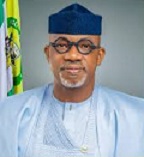Opinion:
BY ABIODUN KOMOLAFE
The illustrious 42-year reign of Oba (Dr.) Gabriel Adekunle Aromolaran, the 40th Owa Obokun of Ijesaland, has come to a close. As we bid farewell to this venerable monarch, may his soul rest in peace, freed from worldly burdens! May God comfort the people of Ijesaland and grant them solace during this difficult time!
Oba Aromolaran was installed on Saturday, February 20, 1982. His remarkable journey came to a close on Wednesday, September 11, 2024. Evidently, his illustrious reign beckons us to contemplate the transience of human existence and the impermanence of earthly authority.
I had a personal connection to Aromolaran’s enthronement, having witnessed a pivotal moment as a student at Ijebu-Jesa Grammar School in Osun State. One fateful evening in 1982, I saw Kabiyesi brought to the palace in Ijebu-Jesa, to perform a traditional rite, a precursor to his ascension to the throne. This experience resonates with the timeless wisdom: ‘Owá kìí dá ni pa kí Ìjèbú-Jèsá má mò.’
Oba Aromolaran’s remarkable reign was marked by unwavering integrity and discerning thinking. As a well-read and well-connected ruler, his straightforward nature and disdain for dishonesty earned widespread respect. Through his steadfast custodianship of culture, Kabiyesi embodied purposeful living. He fostered unprecedented progress and tranquility that endeared him to his people.
Oba Aromolaran’s long and celebrated reign brought peace, development and joy to Ijesaland. As Oba Omololu Afilaka, Alatorin of Atorin-Ijesa, aptly described: “Love him or loathe him, under Kabiyesi’s wise leadership, birds sang sweet melodies, rodents flourished, and humans lived in harmony.” Lawrence Adeyinka Haastrup, Prince of the Bilaro-Oluodo Ruling House and Owa Obokun aspirant, echoed this sentiment: “Oba Aromolaran embodied true leadership values: courage, integrity, compassion, fairness and humility. At 86, he left an enduring legacy marked by numerous groundbreaking achievements, testament to his visionary leadership.”
During Oba Aromolaran’s tenure, Ijesaland witnessed significant educational advancements. The long-awaited University of Ilesa became a reality, fulfilling a 50-year aspiration.
Among other notable institutions established include: School of Health Technology, Ilesa, which now offers Ordinary and Higher National Diploma programmes in Health, and regarded as one of the best in Southwest Nigeria; School of Science, located along Ijebu-Jesa Road; Osun State College of Technology, Esa-Oke, and private institutions like Interlink Polytechnic in Ijebu-Jesa and Daboss Polytechnic in Idominasi.
Oba Aromolaran’s reign also saw the construction of a state-of-the-art Owa’s Palace, considered one of the best in Western Nigeria, including Edo and Delta States. The befitting palace was built by Ijesa sons and daughters.
The revered monarch passionately advocated for an Ijesaman to become the Governor of Osun State, and his relentless efforts ultimately paid off. Under his leadership, Ijesaland also witnessed unprecedented representation in government, producing two Deputy Governors, four Federal Ministers, numerous Commissioners, and several National and State Assembly Members.
Under Oba Aromolaran’s transformational vision, Ijesaland’s mining industry transformed from potential curse to tangible blessing. The Ilesa Geriatric Centre showcases his lasting impact. His reign also saw significant infrastructure advancements, notably the groundbreaking dual carriage road from Roundabout to Imo in Ilesa – the first of its kind in Ijesaland. Once completed, it will greatly enhance connectivity and progress.
As the Deputy Chairman of the Osun State Traditional Council of Obas, Aromolaran’s role in fostering harmony and cooperation among the traditional rulers could not be wished away. Overall, Oba Aromolaran’s leadership ushered in tremendous progress and development across Ijesaland. His passing leaves a void, and he will be deeply missed.
Well, while some may view Oba Aromolaran’s era through the lens of ‘speak no ill of the dead,’ a more nuanced evaluation of his reign reveals areas for improvement. Despite notable achievements, some critics argue that Ijesaland’s development fell short of expectations during his reign. A more critical perspective suggests that during his tenure, some Ijesa youth lost touch with their cultural identity, embracing harmful behaviours and professions, such as cybercrime and prostitution, previously unheard of in Ijesaland.
Historically, Ijesas are renowned for their industrious nature, strong values and unwavering commitment to integrity. They abhor cheating, disrespect and dishonesty. Instead, they embrace diligence and perseverance to achieve success. Ijesas have played crucial roles in establishing iconic institutions and their entrepreneurial spirit and contributions to Nigeria’s growth have been remarkable.
The Ijesa people live by the principle, ‘Orisa bo o le gbe mi, se mi bi o se ba mi.’ (If you the deity cannot improve my condition, then leave me to my fate). This principle emphasizes hard work and integrity. Oba Aromolaran’s leadership embodied this spirit, but his purported romance with autocratic tendencies sometimes sparked conflicts with his chiefs and subjects, raising concerns about accountability and inclusivity. Added to these were land disputes which also marred his reign, with controversies surrounding land allocation and management affecting some communities.
Despite the challenges during his reign, the late Oba Aromolaran has established a benchmark for excellence. As such, the next Owa Obokun must not only meet but surpass this standard. The incoming Owa Obokun must demonstrate exceptional leadership qualities to build upon Oba Aromolaran’s legacy and propel Ijesaland to even greater heights.
The succession process for the Owa Obokun of Ijesaland is guided by the Chieftaincy Declaration, as explained by Osun State Commissioner for Local Government and Chieftaincy Affairs, Dosu Babatunde. According to the Declaration, amended April 24, 1958, approved June 5, 1958, and registered June 7, 1958, the next Owa Obokun will emerge from the Bilaro-Oluodo Ruling House.
“The 13 kingmakers responsible for selecting the next Owa Obokun of Ijesaland, as stipulated by the Chieftaincy Declaration, are: Obaala of Ilesa, Ogboni of Ibokun, Ogboni of Ijebu-Jesa, Ogboni of Ipole, Ogboni of Ilesa, Obaodo of Ilesa, Odole of Ilesa, Risawe of Ilesa, Saloro of Ilesa, Arapate of Ilesa, Lejoka of Ilesa, Loro of Ilesa, and Lejofi of Ilesa. Notably, the Declaration specifies that the next Owa Obokun will emerge from the Bilaro-Oluodo Ruling House.
“Once the mourning period ends, the state government will formally initiate the selection process by notifying the Local Government in writing. The Local Government will then inform the next Ruling House, prompting the Ruling House to convene a meeting under the family head’s leadership. The purpose of this meeting is to nominate a candidate, or candidates from the Ruling House to succeed the throne.
“Upon convening, the Ruling House will nominate a candidate, or candidates, to the kingmakers in writing, to kick-start the selection process. Following this, the kingmakers will inform the Ministry of Local Government and Chieftaincy Affairs via the Local Government. The state government remains neutral, with no preferred candidate or vested interest, focusing solely on overseeing the selection process as mandated by law.”
Throughout history, heritage has served as a nostalgic lens through which we view our past, often glorifying triumphs while overlooking shortcomings. Reality, however, disrupts this nostalgia, forcing us to confront the consequences of our actions. In Ijesaland, this dynamic is especially significant. Reflecting on Oba Aromolaran’s legacy reveals a heritage marked by resilience and tradition, yet shaped by challenges.
Amidst these complexities, aspiration propels us toward a brighter future, where the Owa Obokun’s throne embodies justice, progress and unity. As the succession process unfolds, questions surround Ifa Oracle’s role. “Well, in the eye of the law, Ifa doesn’t nominate Obas and the Declaration didn’t talk about Ifa.” However, “introducing dollars to Ifa, or Ifa to dollars can spark controversy.”
To be continued.
*KOMOLAFE writes in from Ijebu-Jesa, Osun State, Nigeria (ijebujesa@yahoo.co.uk)
 Startrend International Magazine For Your Latest News And Entertainment Gists
Startrend International Magazine For Your Latest News And Entertainment Gists





